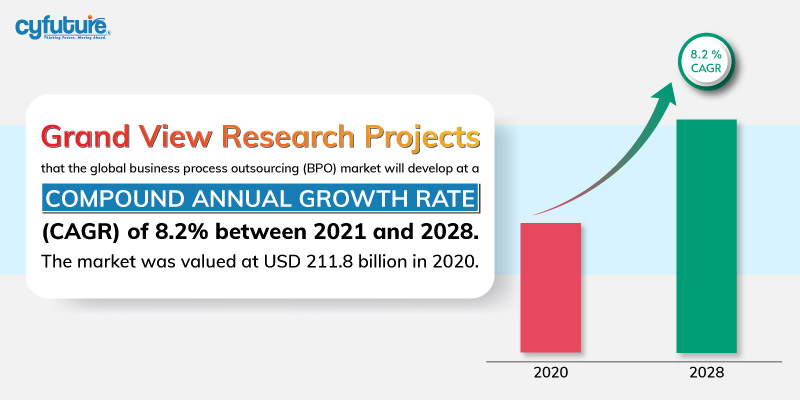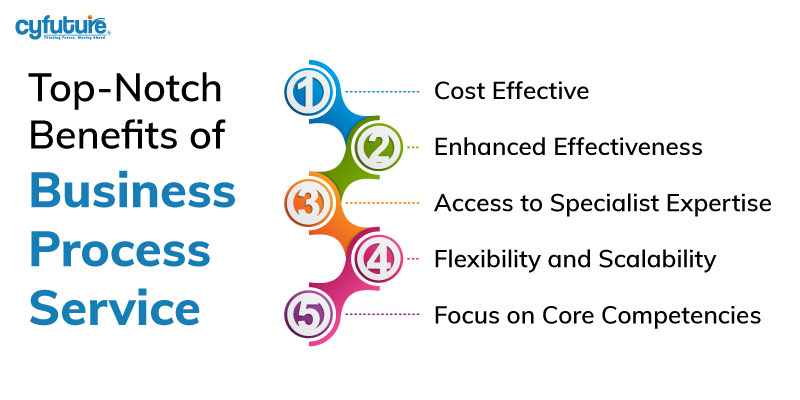-
Get Cloud GPU Server - Register Now!
Toggle navigation

It is impossible to escape changes, especially in the ever-changing world of modern business. Furthermore, being ahead of the curve requires constant innovation, optimization, adaptability, and keeping up. Business process services (BPS) play an increasingly significant role as companies strive to stay ahead of the curve, enhance procedures, and offer excellent value to customers. Furthermore, business process service offers several advantages, such as enhancing efficiency and streamlining processes, which might propel businesses toward prosperity.
However, what are business process services exactly, and how will they affect how companies operate going forward?
Business process services, at their core, are the automation or outsourcing of processes and repetitive activities within an organization. Tasks include data entry, payroll processing, customer support, IT management, and other duties may be included in this. By employing specialist knowledge and cutting-edge technology, businesses may assign these tasks to devoted service providers, freeing them up to concentrate on their core competencies and key projects.
Although business process services are not a novel concept, their importance and popularity have grown significantly in the last several years.

The need for cost reductions, the advent of digital transformation programs, and the growing complexity of business operations are some of the factors driving this development.
In this comprehensive blog piece, we will examine business process services, including their main features, and benefits, along with upcoming changes. Additionally, we aim to present a comprehensive overview of how business process services are transforming the way firms operate, encompassing both theoretical concepts and practical case studies.
However, let’s take a look into a few stats and data before delving deep.
Now, accompany us on this journey as we investigate the possibilities of BPS and how they may foster productivity, creativity, and expansion inside your company.
It is essential to have a solid understanding of the fundamental ideas and elements of business process services before diving into their intricacies. Business process services may be divided into three main types at the most basic level:
By assigning particular responsibilities or processes to outside service providers with specialized knowledge in these fields, outsourcing takes place. This area may encompass customer service, accounting, and human resources. Companies can gain specialized knowledge, save operating costs, and increase productivity by outsourcing some of their work.
Workflows and tedious tasks may be made more efficient with the help of automation technology. This might include utilizing artificial intelligence (AI) algorithms or software robots to do tasks like document processing, workflow management, and data entry. Automation boosts productivity, reduces error rates, and frees up human resources to work on more crucial projects. It also gives employees more time to concentrate on other crucial responsibilities. Human resources might be used to focus on more significant projects.
Integration is the process of merging various programs, systems, and processes inside an organization to enable communication and data transfer. It is the process of integrating many apps, platforms, and internal procedures inside a corporation. Marketing automation platforms, inventory management tools, and supply chain management systems may all be combined. Integrating disparate systems may help businesses reduce organizational silos, promote cooperation, and boost overall performance.

Businesses in all industries can gain from using business process services in several ways. A few of the principal advantages are:
Companies might save substantial money by automating operations or outsourcing repetitive labor to less costly areas. Companies may achieve a more cost-effective operating model by lowering personnel costs, reducing mistakes, and increasing efficiency.
Business process services may assist in simplifying processes, eliminating bottlenecks, and optimizing workflows, resulting in more productive and efficient workflows. Businesses that automate repetitive procedures and optimize workflows may achieve higher service levels, faster response times, and more efficient resource utilization.
Companies that contract with external service providers for their operations may have access to best practices and specialized knowledge in the industry. Through outsourcing, businesses may be able to have access to the knowledge and experience of devoted professionals in fields like financial services, IT administration, and customer care without having to invest a significant amount of money in tools or training.
Business process services allow businesses to adjust their capacity and resources to meet fluctuating demand because of their inherent scalability. Whether they need to grow or shrink during peak or off-peak hours, businesses may easily adapt to changing customer needs and market dynamics.
Outsourcing non-essential activities and procedures allows businesses to focus more of their time, energy, and resources on their core competencies and strategic objectives. Because of this, companies may foster innovation, look into opportunities for expansion, and keep a competitive edge in their markets.
The business process services environment will change significantly as technology advances and market conditions shift. It is projected that several significant topics will impact BPS going forward, including:
The convergence of AI, machine learning, and robotic process automation is fueling the rise of intelligent automation solutions. Enterprises can use these cutting-edge tools to automate intricate tasks, make data-driven choices, and boost the effectiveness and precision of their procedures.
In a highly competitive marketplace, businesses are increasingly focusing on delivering exceptional customer encounters. These kinds of services aid organizations in streamlining client assistance, personalizing interactions, and delivering seamless cross-channel encounters.
Cloud computing is transforming how organizations approach IT administration and service provision. Organizations can access advanced capabilities without having to make huge infrastructure investments with cloud-based business process services.
Business operations are set to be transformed by blockchain, Internet of Things and virtual reality in the upcoming years. Business process service providers are increasingly integrating these technologies into their offerings, allowing organizations to unlock new opportunities for innovation and efficiency. Organizations are now able to unlock new opportunities for innovation and efficiency.
Data security and compliance have become paramount concerns for enterprises due to the increasing prevalence of cyber threats. Businesses are investing in security measures, compliance frameworks, and risk management protocols to safeguard sensitive information and mitigate potential risks.
Given the changing nature of the business environment, a proactive approach to improvement and innovation is required. Business Process Services is driving this transformation with a suite of solutions that boost productivity, efficacy, and growth. As 2030 approaches, a variety of factors—including cost-efficiency, enhanced efficacy, availability of specialist knowledge, flexibility, and scalability—will continue to drive the importance of BPS.
In the coming years, several factors are expected to influence the direction of business process outsourcing (BPS), including the rise of intelligent automation, an increased emphasis on customer satisfaction, a shift to cloud-based solutions, the integration of cutting-edge technology, and a focus on data protection and compliance.
Businesses must see BPS as a strategic need if they are to succeed in this shifting environment. Using the expertise of BPS providers and staying aware of emerging trends might help companies take advantage of new opportunities.
We kindly urge you to take advantage of the chance that business process services provide to revolutionize your company and position yourself for sustained success in the fast-paced commercial world.
In 2030 and beyond, are you prepared for success in the economic world? Use business process services to see the possibilities immediately.
By 2030, business executives should place a high priority on innovation, agility, and customer-centricity. By integrating cutting-edge technology, streamlining procedures, and concentrating on offering customers value, BPS assists companies in achieving these objectives. Adopting BPS is in line with the growing demands and expectations of the market.
The complexity of adopting BPS may vary depending on your company’s size and kind. However, with proper planning and guidance from skilled service providers, a smooth and efficient transition is feasible. Numerous BPS providers offer customized solutions to match each company’s unique needs and specifications.
When utilizing BPS, organizations prioritize data security. To secure sensitive data, trustworthy service providers adhere to strict security policies and legal regulations. Make sure a BPS supplier has a history of preserving confidentiality and has adequate security measures in place before partnering with them.
BPS can optimize a wide range of administrative processes, including data entry, payroll processing, customer service, IT administration, and others. Furthermore, technological advancements allow for the automation or outsourcing of increasingly complex operations, enhancing productivity and efficiency.